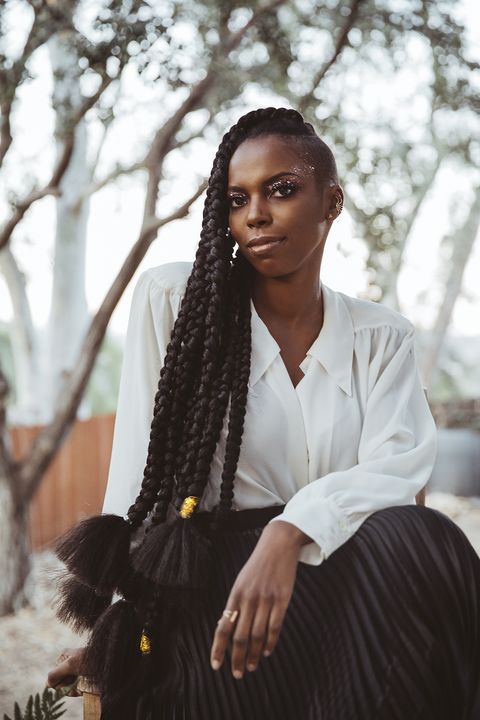Most sitcoms are squeamish around the topic of money, but ABC’s Home Economics dives right in. The show, which debuted in April and premiered its second season last month, follows the trials and tribulations of three siblings: wildly rich Connor (Jimmy Tatro), middle-class Tom (Topher Grace), and Sarah (Caitlin McGee), who is struggling financially.
As Sarah’s schoolteacher wife, Denise, played by Saturday Night Live and Woke alum Sasheer Zamata, serves as a gentle voice of reason. And, thankfully, the second season offers more insight into her inner world, digging into her complex family dynamic. It’s a role that makes sense for Zamata, who tells BAZAAR.com that she tries “to pick projects that align with my values.”
Without being too heavy or taking itself too seriously, Home Economics discusses very real economic and social disparities in America, along with the kind of familial tensions that financial issues can often bring. That’s key for Zamata, as she says that she blends balance and depth in all her work.
Below, she shares more with us about filming the sitcom’s latest season, being in Hollywood during the coronavirus pandemic, and using comedy to break down barriers.
Home Economics struck a nerve during the pandemic. What do you think resonated with viewers?
I feel like the fact that the show has lasted through a pandemic is a testament to the writing and our chemistry as a cast. I think people have really been leaning on their communities, whether that be their friend groups or their family. We spent a couple years realizing how precious time is and how anything can happen. So communities are just a lot more valuable to all of us now. It makes people feel good to watch a show that acknowledges that all families have their issues, but they can come out of it in a positive way.
What new aspects of Denise are we getting for Season 2? What parts of yourself do you channel in Denise?
Denise has been, for the most part, very “woo woo” and provided a calming energy for the Hayworth family. The siblings can get pretty riled up, and Denise is usually there to remind people to chill. I do feel like I serve that purpose in some of the relationships in my life, and there’s definitely tools that I’ve used in my own life that Denise also uses—I’m definitely more of the mediator in a lot of ways with my family—but sometimes, I also do need calming down myself.
We introduce Denise’s sister in the show this season, and you can see that how she reacts to her own family is pretty different from how she react to the Hayworths. These family relationships bring more angst and aggravation, so Denise is definitely more dynamic this season.
How has this show been different from other things you’ve worked on?
I’ll always remember this experience, because we shot it during COVID earlier this year. I’m so glad we were able to do it, because I’ve also been on productions that were trying to shoot during the pandemic. I’ve had a lot of shutdowns—you know, COVID is real, and it’s out there, and it can seriously affect the workplace.
So this does feel like a lucky show in that it keeps managing to get through all the barriers that are thrown at it. I love that we’re shooting in L.A., and then I get to go to work and then actually come home to my house. And I love the cast so much. I feel very lucky and in safe hands, because everyone wants to do a good job and go home safely.
What was your favorite part about filming Season 2?
For the premiere episode, we went to a 49ers game at the USC stadium. It was just so nice to actually go on location somewhere after an entire first season with COVID. It just felt like, “Oh, we’re back. Things are opening up, and we can live a little bit every time we leave the stage.” It’s awesome that we actually get to explore what these characters do outside of their houses.
Your projects often balance comedy with politics. How do you keep things funny while still preserving the impact of the message?
I’ve worked on shows, like Hulu’s Woke, where the staff had a great comedic lens on sociopolitical issues, and that’s my thought for my own comedy. I try to infuse that into my stand-up, or any writing that I do. I try to pick projects where I feel like the audience will get something out of them besides just entertainment. I want something that’s educational, that gets an audience to think about things and challenges their perspective.
I really like when people come up to me say, “Whoa, I saw this thing that you did, and I didn’t know that this was part of your culture. I didn’t even think about these perspectives.” I think that’s awesome. Comedy is a really cool way to get people to think differently and make connections, because it breaks down barriers and opens us up a little more to ideas and things that we may have originally been averse to.
This interview has been edited and condensed for clarity.
This content is created and maintained by a third party, and imported onto this page to help users provide their email addresses. You may be able to find more information about this and similar content at piano.io
Sasheer Zamata on Season 2 of Home Economics and How Comedy Can Break Barriers
Source: Filipino Journal Articles



0 Comments